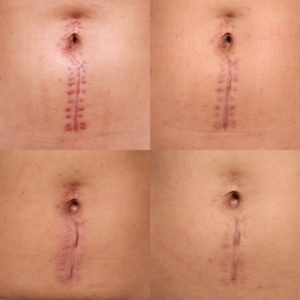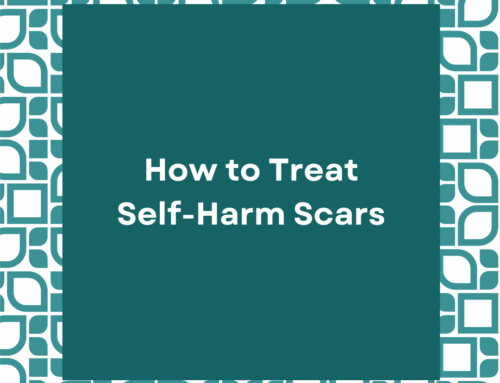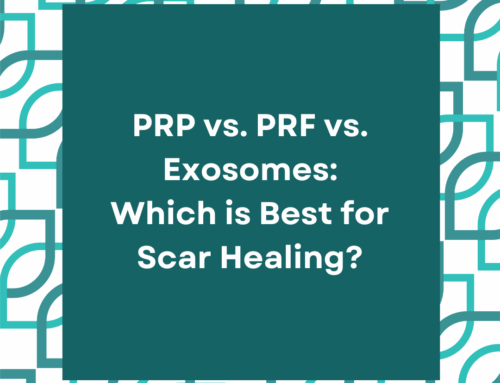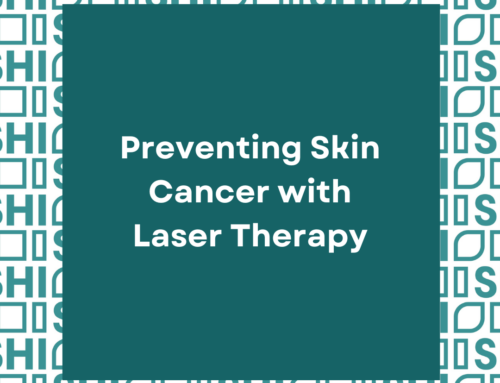Pregnancy is a remarkable, life-changing experience that brings the gift of new human beings into the world. However, pregnancy can also leave behind scars, which can serve as unwanted and traumatic memories of painful childbirth. In this blog, we will discuss the various causes, treatment options, and preventative measures that can be implemented to minimize their appearance.
What are Pregnancy Scars?
“Pregnancy scars” are a casual term to describe stretch marks that arise from excessive pulling of the abdominal skin as the baby grows. Although hormonal changes during pregnancy increase skin elasticity to adapt to the growing belly and breasts, the rapid stretching of skin causes tears in the dermis, which is replaced by scar tissue.
Stretch marks are not the only type of scars that can form from pregnancy. Scars from birth by cesarean section (C-section), for instance, are also common. Briefly, C-section is a procedure in which the surgeon delivers the baby through an incision made through the uterus and overlying abdominal skin. The incisional scar tends to heal and fade on its own but can persist and worsen over time like C-section scars. For the purposes of this blog, however, we will be focusing specifically on stretch marks.
Causes of Pregnancy Scars
Pregnancy scars are caused by rapid and excessive stretching of the skin as the belly expands. The likelihood and severity of pregnancy scars are compounded by the extent of the pregnancy; women who have twins or multiple pregnancies are more likely to develop more drastic pregnancy scars. Also, genetics can also play a role. Women of color, in particular, are more prone to post-inflammatory hyperpigmentation, which can make the stretch marks more noticeable.
Types of Pregnancy Scars
Pregnancy scars come in all shapes, sizes, and colors. Most scars show up as long, thin jagged lines on the skin that once contoured the enlarged belly during pregnancy. Fresh pregnancy scars tend to be red or purple, which is indicative of blood flow or bruising of the healing skin. Over time, this color may evolve and become hyper-pigmented (brown) or hypo-pigmented (white), depending on every person.
Are Pregnancy Scars Permanent?
So are pregnancy scars permanent? Unfortunately, as with all scars, the answer is yes. However, this does not mean that the scars are untreatable. In fact, there are a myriad of treatments available to drastically reduce their appearance and make them imperceptible to the human eye.
What are Some Treatments for Pregnancy Scars
There are a variety of non-invasive treatments available for pregnancy scars. While there is no universal cure to pregnancy scarring, it is highly important to get started as soon as possible. It is no secret that older scars are harder to treat than younger scars, as collagen and elasticity depletes with age.
Below are several treatments that you can explore to reduce the appearance of your pregnancy scars:
Laser Therapy
Laser therapy is one of the most effective standard treatments for pregnancy scars. Laser emits specific wavelengths of light to cause controlled damage to the epidermal and dermal layers. The effects include the production of fresh collagen, thickening of the skin, and improved blood flow to heal the previously damaged skin.
Many ask what are the best lasers to treat pregnancy scars. The answer is that it really depends on what layer you are targeting. Ablative laser uses thermal energy to “burn away” the top layer of skin to improve texture and promote collagen production. Non-ablative lasers, on the other hand, exert the same effect but bypass the top layer of skin. Additionally, non-ablative lasers are particularly useful for targeting blood vessels in the skin to reduce redness.

Microneedling
Microneedling is another treatment method that can help reduce pregnancy scars. As the name suggests, microneedling works by punching hundreds of microscopic holes into the skin to stimulate collagen production.
Keep in mind that microneedling requires numerous sessions with regular intervals to see significant results. Also, results can be affected by the number of passes and the depth of penetration by the microneedling device.
Chemical Peels
Chemical peels is a popular at-home and in-office treatment for pregnancy scars. There are a variety of alpha-hydroxy and beta-hydroxy acids, including glycolic acid, salicylic acid, lactic acid, and the list goes on. These peels, however, are quite superficial and may only improve textural irregularities. Deeper peels, such as Jessner’s peel or TCA, can produce more drastic results, although with more adverse side effects.
Chemical peeling is often combined with microneedling to improve its absorption by the skin. The microscopic channels created by microneedling allow the chemical agents to travel deeper into the skin to enhance collagen production.
Microdermabrasion
Microdermabrasion is essentially a less intense version of dermabrasion. Microdermabrasion is performed by using a motorized device that brushes fine crystals across the skin. Think of it as a minor scratch against a rough surface but one that causes very minimal bleeding.
There are mixed opinions about how effective microdermabrasion is. It is more suitable for “buffing out” the edges of depressed pregnancy scars. Deeper scars are less responsive to microdermabrasion due to its inability to penetrate deeper into the skin.
Radiofrequency
Radiofrequency is similar to laser therapy in that it delivers energy waves to rejuvenate the skin. The fundamental difference is that lasers deliver concentrated light energy, whereas radiofrequency uses radiofrequency waves. Radiofrequency can also use other high energy sources, such as ultrasound waves.
When it comes to pregnancy scars, radiofrequency is particularly effective for deep tightening of the skin. Radiofrequency can be combined with more superficial modalities, such as microneedling, to further enhance its effects.
A seemingly frequent clinical observation, however, is that radiofrequency has the potential to thin the skin. It is important to discuss this potential adverse side effect with your dermatologist to see if radiofrequency is right for you.
Subcision
Subcision is an effective approach for treating depressed scarring. This method entails using a syringe needle or cannula to mechanically break apart adherent scar tissue in the deep dermis. It is usually performed for depressing rolling acne scars and cellulite, types of scarring that arise from tethering in the skin.
In more severe cases of pregnancy scarring where the marks are still depressed even upon manual stretching of the skin, subcision may be a viable treatment option.
Subcision can be combined with topical treatment methods, such as chemical peeling, microneedling, and laser therapy. Even diluted fillers can be added simultaneously, a treatment known as mesotherapy.
Prevention Tips for Pregnancy Scars
Pregnancy scars may not be totally avoidable, but there are steps that you can take to minimize their appearance and avoid the need for harsher treatments down the line. Drinking plenty of fluids and maintaining a protein-rich diet can maintain the skin’s elasticity. Avoiding smoking and other nicotine products as well as sun exposure can further prevent thinning and damage to the skin. Additionally, initiating skin-tightening treatments as soon as possible is important since “young” scars tend to be more responsive to treatment.
Conclusion
Pregnancy scars are unsightly stretch marks that are permanent but highly treatable. There are a variety of manual and energy based methods available to treat pregnancy scars, including lasers, microneedling, chemical peels, microdermabrasion, radiofrequency, and subcision. Each treatment method has its pros and cons, and the most important factors to determine which is right for you will depend on the type and severity of your pregnancy scars.
Having a baby can be exciting but also scary at the same time. If you take the right steps to prevent and treat your pregnancy scars, nothing should stop you from treasuring this amazing period in your life. Contact us at Scar Healing Institute to help guide you through this next phase of your life and help heal any unwanted scars remaining after pregnancy and pregnancy related surgeries.




